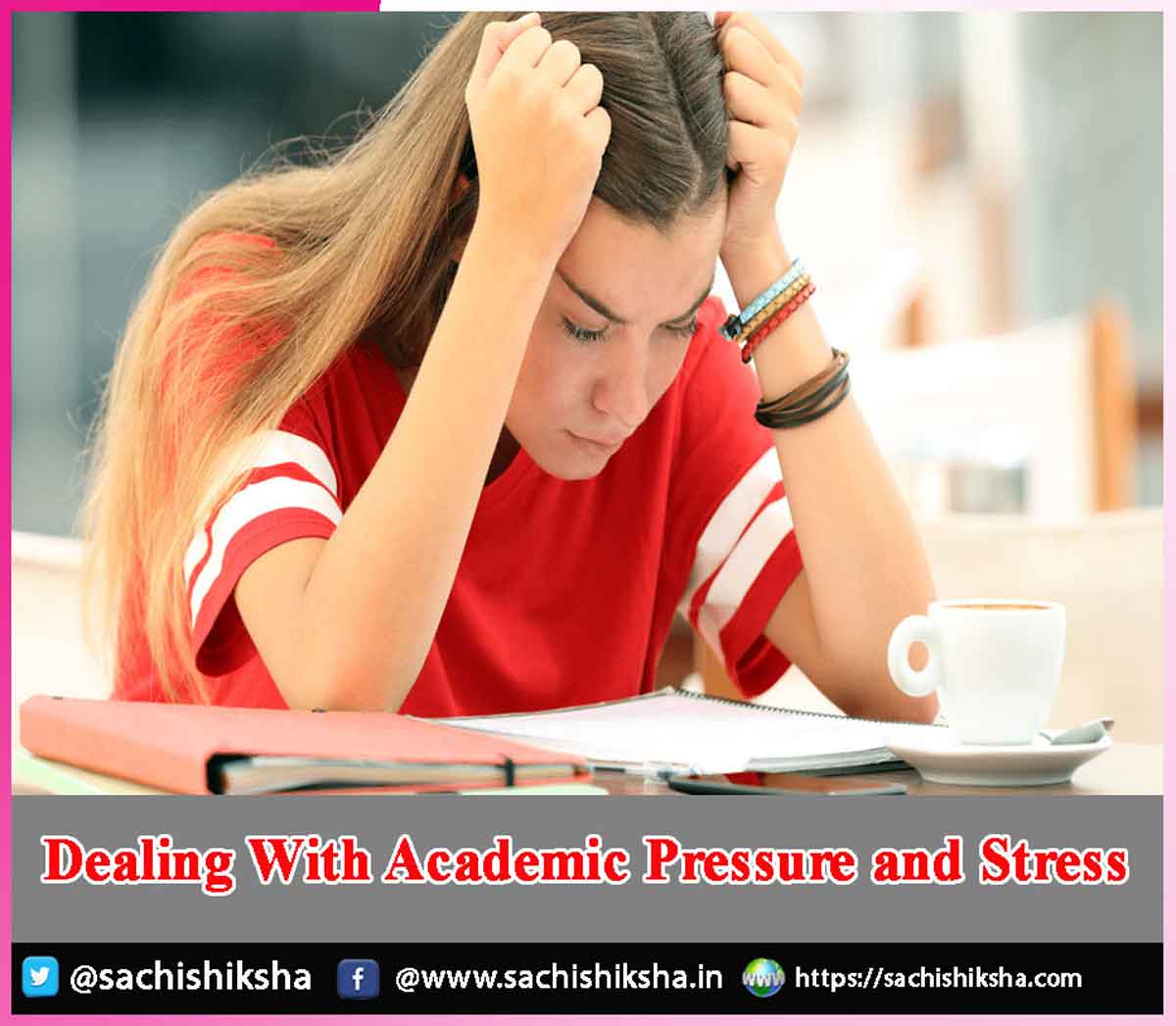Dealing With Academic Pressure and Stress
Introduction: In today’s world, academic pressure has become one of the most prevalent stressors among students. Whether in high school or college, students across the globe face mounting expectations from their families, peers, and society. These expectations often manifest in the form of heavy workloads, competition for grades, the drive for academic excellence, and the pressure to succeed in the job market. As a result, the stress levels among students are rising, leading to various mental health issues such as anxiety, depression, and burnout.
Table of Contents
Understanding Academic Pressure

Causes of Academic Pressure:
- High Expectations: Many students face immense pressure to meet the high academic expectations set by their families, teachers, and even themselves. Parents often expect their children to get top grades or gain admission to prestigious institutions, which increases stress.
- Competition: In today’s highly competitive academic environment, students often feel the need to outperform their peers. This competition can be intense, especially in fields like medicine, engineering, and business, where every point counts towards securing a future job.
- Time Constraints: A heavy workload combined with limited time for completion often contributes to stress. Balancing homework, assignments, projects, exams, and extracurricular activities leaves little time for self-care or relaxation.
- Perfectionism: Some students place excessive pressure on themselves to achieve perfect results in every subject. Perfectionism often leads to a fear of failure and the inability to accept mistakes, increasing anxiety and stress.
- Social Media Influence: Social media has become a double-edged sword in the academic world. On one hand, it offers inspiration and support; on the other hand, it exposes students to the curated, idealized achievements of others, leading to feelings of inadequacy and comparison.
The Consequences of Academic Pressure
When academic pressure becomes overwhelming, it can have serious consequences for a student’s mental and physical health. The following are common consequences:
- Mental Health Issues: Chronic academic stress can lead to anxiety, depression, and burnout. The constant worry about performance can interfere with emotional well-being and self-esteem.
- Physical Health Problems: The stress associated with academic pressure can manifest in physical symptoms such as headaches, sleep disturbances, and digestive issues. Prolonged stress can also weaken the immune system, making students more vulnerable to illnesses.
- Reduced Academic Performance: Ironically, the very pressure meant to improve academic performance can have the opposite effect. Stress can impair concentration, memory, and cognitive function, leading to poor academic results.
- Relationship Strain: Academic pressure can also negatively impact personal relationships. Students who are constantly focused on their studies may neglect their family and social life, leading to feelings of isolation.
Coping Strategies for Academic Stress
While academic pressure is a common experience, it’s important to develop effective strategies to manage stress and maintain overall well-being. Here are some practical methods for dealing with academic stress:
Time Management Techniques:
Practicing efficient time management is one of among the most efficient ways for dealing with academic stress. Effective time management reduces the feeling of being overwhelmed and ensures that tasks are completed efficiently.
- Prioritize Tasks: Make a to-do list of tasks and prioritize them based on deadlines and importance.
- Use a Planner or Digital Calendar: Plan your day, week, and month ahead. Set aside particular hours for studying, tasks, and other things to do. Using a planner or a digital calendar will help you stay organized and focused.
- Avoid Procrastination: Procrastination is one of the main causes of stress. If you delay assignments or studying, tasks pile up, leading to feelings of being overwhelmed. Overcome procrastination by setting small, achievable goals and rewarding yourself for completing them.
Mindfulness and Relaxation
Awareness and relaxation practices are excellent instruments for reducing stress and enhanced concentration. They allow students to stay present and reduce anxiety related to academic tasks.
- Practice Meditation: Taking a few minutes each day to meditate can help calm the mind, reduce anxiety, and improve focus. Structured mindfulness apps or videos are an effective way to begin your practice.
- Deep Techniques for Breathing: Techniques such as breathing through the diaphragm, contribute to the human body’s relaxing mechanism. This can reduce heart rate, lower blood pressure, and calm the mind.
- Yoga: Yoga is a practice that includes bodily positions, exercises for breathing, and mindfulness to help individuals unwind and clear their minds. It’s an excellent practice for reducing stress and maintaining physical health.
Cognitive Behavioral Strategies
Cognitive Behavioral Therapy (CBT) techniques can help students challenge negative thinking patterns that contribute to academic stress. By reframing negative thoughts, students can reduce feelings of anxiety and improve their mental well-being.
- Reframe Negative Thoughts: “I’m never going to make it,” or “I’ll fail,” challenge these thoughts. Modify them with more optimistic and realistic statements like, “I have prepared myself effectively and I am capable of handling this.”
- Set Appropriate Expectations: Establishing goals that are unattainable might cause frustration and exhaustion. Divide down larger ambitions into smaller, more manageable actions. Celebrate progress along the way, rather than waiting for perfection.
Social Support
Having a strong support system is crucial for managing academic stress. Support from friends, family, and peers can provide emotional comfort and practical help during stressful times.
Talk to Someone You Trust:
Share your worries with someone who can listen and offer guidance. This may be a relative, close companion, or therapist. Talking about your stress can help alleviate feelings of isolation.
Join Study Groups:
Study groups can offer both academic support and social connection. Working with peers can help clarify difficult concepts, and the camaraderie can reduce feelings of stress.
Ask for Expert treatment:
If pressure grows too much, it’s critical to look for medical attention. School counselors or therapists can provide coping strategies and support for managing academic anxiety.
Self-Care and Balance
Sustaining both mental and physical wellness requires striking a balance between educational commitments and the practice of self. Prioritize activities that promote well-being and relaxation.
Sleep Well:
Adequate sleep is essential for cognitive function and overall health. Avoid all-nighters, and try to maintain a regular sleep schedule.
Eat Nutritious Meals:
A healthy diet plays a vital role in managing stress. Eating balanced meals with plenty of fruits, vegetables, and protein can help maintain energy levels and improve focus.
Take Breaks:
Taking regular breaks from studying can help prevent burnout and improve productivity. Use breaks to engage in activities that relax and refresh you, such as walking, listening to music, or socializing.
Pursue Hobbies:
Engaging in hobbies, whether it’s painting, playing an instrument, or reading for pleasure, can provide a sense of accomplishment and relaxation.
Conclusion
Academic pressure is an unavoidable aspect of student life. By recognizing the causes of stress and implementing effective coping strategies such as time management, mindfulness, social support, and self-care, students can learn to manage academic pressures in a healthy and sustainable way.
Keep in mind that you are not single in feeling academic stress. Every person confronts obstacles, and it’s acceptable to seek assistance when necessary. Prioritize your well-being, and don’t hesitate to make adjustments to your routine to ensure that you’re not sacrificing your mental and physical health in the pursuit of academic success.














































